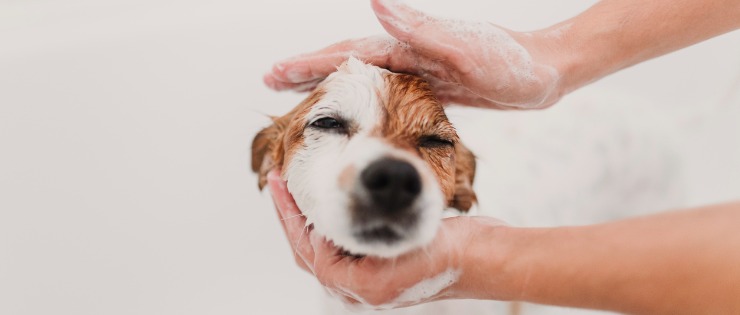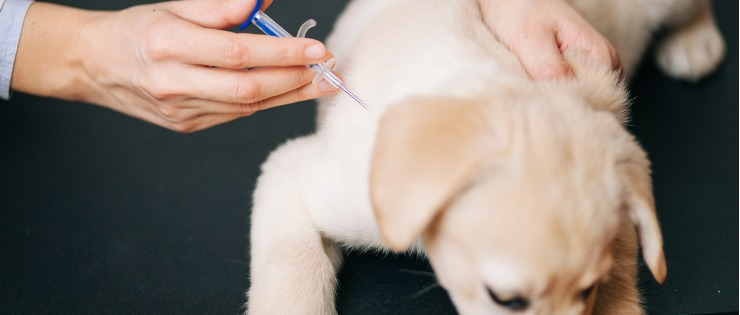#4 Feeling Less Lonely
For people who live alone, evenings and bedtimes can be the loneliest times. Having a pet can provide much needed companionship, and co-sleeping with a dog can make going to bed a little less lonely, again helping to boost mental health.
#5 Less Potential for Allergies Later in Life
Research has shown that children who live and spend time in close contact with their pet may develop fewer allergies later in life. A pet that is seldom in the house doesn’t provide the same level of protection that you get from having a pet that is in close contact. It’s thought that pets carry microbes that stimulate the human immune system to protect us from asthma, hay fever and eczema.
#6 Warmth
No need for an electric blanket in winter if you sleep with your dog. A large dog can generate considerable heat that will help keep the bed and room warm.
Cons of Co-Sleeping With Your Dog
With a number of pros to weigh up comes a number of cons to consider too. From behavioural concerns to cleanliness and hygiene, there are also a number of things that you may believe outweigh the pros of allowing your dog to sleep on your bed.
#1 Potential Bite
Your dog might not be a biter during the day, but it’s hard to know how your dog will react if they are suddenly woken. Some dogs will bite instinctively in self defence if startled while asleep. If you roll or knock your dog while you’re both asleep, it can be enough to cause them to bite.
#2 Knowing Their Place in the House
If your dog has some aggressive or guarding tendencies, allowing them to hop onto your bed may not be the best option. Most dogs understand their place in the family is below the humans because we stand well above them. If they’re allowed on the bed, they’re at the same level as us and can feel they’ve moved higher in the pecking order.

#3 Cleanliness
Even the cleanest dog sheds hair and dander, which ends up on the doona or sheets. Pet dander can impact people with allergies, particularly if they are spending a long period with the dog in close proximity. Even if you don’t suffer from adverse reactions to the fur and dander, you might find you need to wash your sheets and doona more regularly than you otherwise would. If your dog spends part of the day outside, they can bring in all kinds of dirt or even pesticides on their coat and feet.
#4 Bathing Your Dog More Often
Dogs who spend time on their owner’s bed may need bathing more often than dogs that sleep elsewhere. Your fur baby’s smelly coat may be more obvious to you when you’re in your bedroom than in other parts of the house.
#5 Passing on a Disease
Animals carry different diseases and viruses to humans. While you won’t pass on your cold or flu to your pet dog, it is rare but possible for your dog to make you sick. Dogs can carry parasites and viruses that may not make them sick but can be passed on to their owner, making them very sick.

One of these diseases is known as a zoonotic disease, which occurs when a dog licks their owner’s face or an open wound. Some of the diseases that dogs can pass on to humans include rabies, salmonella, noroviruses, and campylobacter, to name a few. The people most at risk of these diseases are young children and immunocompromised people. Only feeding your dog cooked meat instead of raw can reduce the risk of salmonella and campylobacter.
If you have a sore, make sure you cover it before bed so your dog isn’t tempted to ‘make it better’ with a few licks. It’s best to discourage your dog from licking your face at all times. Make sure your dog is kept up to date with his vaccines and worming tablets to reduce the risk.
Should I Let My Dog Sleep on My Bed?
There are plenty of pros and cons to consider as to whether or not you should let your dog sleep on your bed. With that in mind, it’s important that you consider what’s important to you and what you would rather - every person and situation is different. It’s all down to personal preference, you’re not right or wrong either way.
If you start allowing your dog on the bed and then change your mind, it can take some time for the dog to comply and stay on the floor or out of the bedroom, so think carefully if this is the right habit for you now and in the future.
If having the dog on your bed is out of the question but you want to enjoy some of the benefits that come with co-sleeping, try allowing your dog to sleep in your room, but on the floor in their own bed. You might find this arrangement suits you both - you’re still very close to each other while you sleep in your own space.
Whether you let your dog sleep on your bed or not, you can still ensure they get the VIP (very important pet) treatment. With two different levels of cover, HIF's pet insurance helps provide protection against specified accidental injuries, cover of selected routine care treatments, emergency boarding for your pet, and more! Take a look at your options with HIF Pet today.